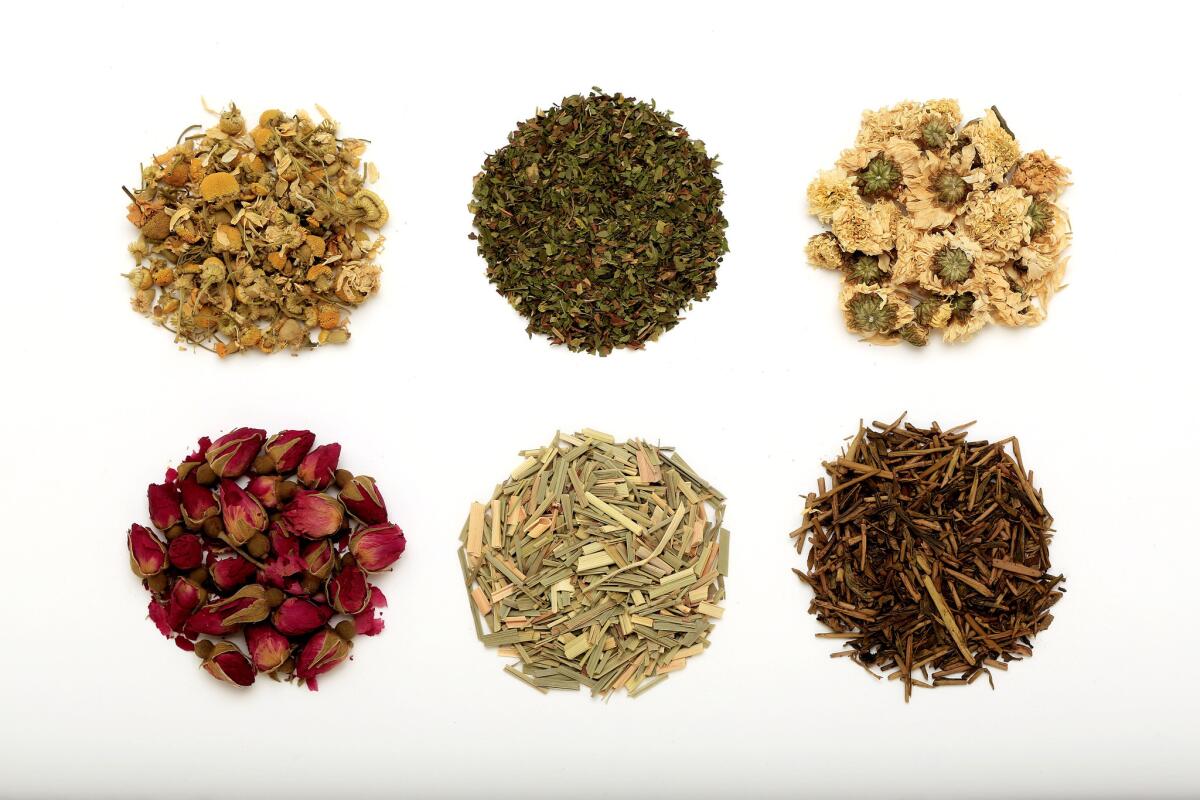Some facts and myths about tea

- Share via
Adding milk to tea negates its health benefits.
False, according to Kerri-Ann Jennings, a registered dietitian. “Although previous studies said this was the case, the most recent research has found that adding milk to tea does not negate its healthy benefits.”
Pregnant women should be cautious about their tea consumption.
True. Black and green tea contain caffeine, which pregnant women are advised to limit. “Herbal teas are blends of products and could contain products that could be harmful to pregnant women. Pregnant women should consult with their physicians about all herbal products as well as about drinking tea that contains caffeine,” says Diane McKay, an antioxidants researcher at the Jean Mayer USDA Human Nutrition Research Center on Aging at Tufts University.
Some teas can cause allergic reactions.
True. If flowers make you sneeze, remember that chamomile tea is derived from the chamomile flower. Rose hips are a common additive to herbal teas. If you are sensitive to particular plants or find an unusual reaction to any tea, seek an alternative.
You should not take vitamins and tea together.
Sometimes true. Tea, especially black tea, blocks iron absorption from foods and supplements. McKay recommends avoiding tea when taking vitamins and while eating foods that are rich in iron. “This is especially important for pregnant women who take prenatal vitamins,” she says.
Drink tea if you have a cold.
True. “For colds and sore throat, a warm cup of any kind of tea will likely help soothe a sore throat immediately. Teas made from Camellia sinensis, i.e., black, green and oolong, have antioxidant and anti-inflammatory properties that may help alleviate symptoms,” McKay said.
Green tea can interfere with anticoagulants.
True. Green tea is a significant source of vitamin K, which can interfere with the effects of blood thinners such as warfarin. Since large quantities of green tea have been shown to decrease the effectiveness of warfarin, talk to your doctor if you take blood thinners.
Hot tea is healthier than iced tea
False. Iced tea is much more popular than hot tea in the United States. Homemade iced tea can be as healthful as hot tea, McKay notes, but only if you brew it yourself. And you have to drink more iced tea to get the same benefit as hot tea. “If you think about how iced tea is made, you start by brewing several bags in some boiled water, but then you dilute it and add ice, so 1 cup of home-brewed iced tea will have a lower amount of flavonoids than 1 cup of fresh brewed hot tea.”
Drinking raspberry leaf tea can ease the pain of giving birth.
Not true. Although there have been many reports by midwives and alternative practitioners that raspberry leaf tea can reduce the pain of labor and make giving birth easier, there is little research to support this, according to Giancoli. But it won’t cause any harm, either.
Tea is tea. Don’t bother with expensive teas.
False. All teas are not created equal, according to Jenny Perez, education coordinator of the American Botanical Council. Her advice: “Look for brands that use pharmacopoeial quality herbs, a standard for quality, purity, strength, identity and composition.” And, of course, there’s plenty of personal preference involved. Perez says she buys Traditional Medicinals teas.
ALSO:
Gluten-free markets spring from personal need
Having trouble sleeping? These products aim to help
More to Read
Eat your way across L.A.
Get our weekly Tasting Notes newsletter for reviews, news and more.
You may occasionally receive promotional content from the Los Angeles Times.






